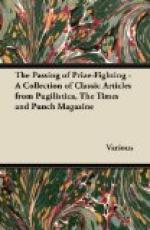How to play the part of Paris where all the competitors have some irresistibility, as all have of either sex! Once I thought that Wee Mo of Westwood was my heart’s chiefest delight, “a flame-red little dog with black mask and ear-fringes, profuse coat and featherings, flat wide skull, short flat face, short bowed legs and well-shaped body.” But then I turned back to Broadoak Beetle and on to Broadoak Cirawanzi, and Young Beetle, and Nanking Fo, and Ta Fo of Greystones, and Petshe Ah Wei, and Hay Ch’ah of Toddington, and that superb Sultanic creature, King Rudolph of Ruritania, and Champion Howbury Ming, and Su Eh of Newnham, and King Beetle of Minden, and Champion Hu Hi, and Mo Sho, and that rich red dog, Buddha of Burford. And having chosen these I might just as well scratch out their names and write in others, for every male face in this book is a poem.
The ladies, as I have said, are in the minority, for obvious reasons, for these little disdainful distinguished gentlemen figure here as potential fathers, with their fees somewhat indelicately named; for there’s a husbandry on earth as well as in heaven.
Such ladies as are here are here for their beauty alone and are beyond or below price. Their favours are not to be bought. Among them I note with especial joy Yiptse of Chinatown, Mandarin Marvel, who “inherits the beautiful front of her sire, Broadoak Beetle”; Lavender of Burton-on-Dee, “fawn with black mask”; Chi-Fa of Alderbourne, “a most charming and devoted little companion”; Yeng Loo of Ipsley; Detlong Mo-li of Alderburne, one of the “beautiful red daughters of Wong-ti of Alderburne,” Champion Chaou Ching-ur, of whom her owner says that “in quaintness and individuality and in loving disposition she is unequalled” and is also “quite a ‘woman of the world,’ very blasee and also very punctilious in trifles;” Pearl of Cotehele, “bright red with beautiful back”; E-Wo Tu T’su; Berylune Tzu Hsi Chu; Ko-ki of Radbourne and Siddington Fi-fi.
Every now and then there is an article in the papers asking and answering the question, What is the greatest benefit that has come to mankind in the past half century? The answer is usually the Marconi system, or the cinema, or the pianola, or the turbine, or the Roentgen rays, or the telephone or the motor car. Always something utilitarian or scientific. But why should we not say that it was the introduction of Pekingese into England from China? According to an historical sketch at the beginning of this book, the first Pekingese were brought over in 1860, after the occupation of Pekin by the Allies. The first black ones came here in 1896, and now in 1914 there are thousands of these wholly alluring and adorable and masterful little big-hearted creatures in England, turning staid men and women into ecstatic worshippers and making children lyrical with cries of appreciation. The book before me is the finest monument yet raised to this conquering breed.




